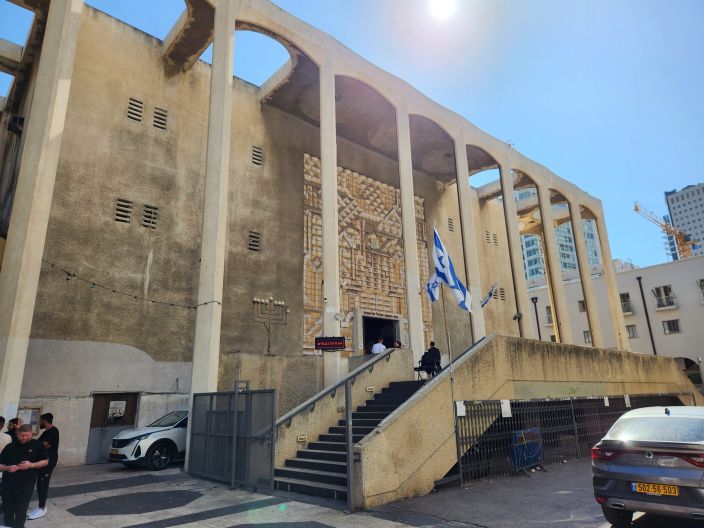The Great Synagogue of Tel Aviv

One of the maggidim/darshanim preachers in Lithuania was HaRav Yitzchok Lipman, son of HaRav Yisroel Salanter. Several of his talks for the Yomim Noraim remain. Once he said:
The shofar is like a violin, and just as one can play soul music or happy tunes, similarly, the shofar can, through joy in the terua and its resonance, stimulate us to improve — leshaper — our deeds or, alternately, evoke sentiments, like the ominous sound of doom of 'the day of shofar and terua' and similarly, 'for the day of Hashem is great and terrible indeed, and who can absorb it.'"
A violin requires a hollow interior to resonate the sound produced. The quality of the violin depends on its hollow structure. If someone were to play the strings on a piece of paper, nothing of quality could emerge.
The strings in this analogy are the sounds of tekiya, shevarim, terua, which must tune up the heartstrings of the listener.
The heart is likened to the wooden hollow structure of the violin itself. The heart is aroused by the shofar, which has the power to 'sweeten' or mitigate harsh decrees and encourage elevation and spiritual gain. This is implied by 'and You hearken to the sound of the shofar' from a person's heart, and 'listens' — registers the submission of the heart, 'and there is none to compare with You', for without this, how can one say that He listens to the sound of the shofar?
A simple person hears only the acoustic sound of the shofar, as a farmer merely 'plays' simple tunes. But a musician, producing music by mouth or instrument, according to the guidelines of music, can arouse a sophisticated person through his playing to a full appreciation and lasting enrichment.
Music is an action of the soul and one who can produce quality song will succeed in having effect upon his listener. 'Fortunate is the nation which is knowledgeable of terua.' How to use the shofar and deliver its tune to Hashem Who hears the shofar sound, understands it and hearkens to it. He intuits to the heart and examines the discerning kidneys and heart, Who studies the deeds and listens to the music.
Seek Abba in the Beis Hamedrash
After leaving Minsk in 5694, the Maggid of Minsk, HaRav Binyomin Shakovitzky, went to live in Tel Aviv, where he remained until his passing in 5699.
The Maggid took his place on the bimah of the central Beis Haknesses Hagodol in Tel Aviv and began:
On my way here, I met a little boy weeping profusely.
'What's your name?' I asked him.
'Srulik.'
'And why are you crying?'
'I lost my father and can't find him.'
'Perhaps we should start walking around and look for him,' I suggested.
'But I already looked all over and couldn't find him,' he wept.
'Where did you look for him? On which streets?'
'Herzl, Bialik, Achad Ha'am, Shenkin...'
'Come, let's look for him in the Beis Medrash.'
"Do you hear this, my friends?" the Maggid continued. "Srulik lost his father. He slipped his hand out of his father's clasp, and wandered off to the bustling, hustling streets when he suddenly saw an interesting attraction, something new come to the world, which he wished to examine for himself. it piqued his curiosity, which made him lose his father and remain alone, lost in the midst of the big, throbbing city.
"Rabboisai, little Srulik is not the only one who lost his father. Big Srulik has also lost track of his father.
"But where is he looking for him? On the streets of Herzl, Bialik, Achad Ha'am. But that's not where his father is. The more he looks for him on those streets, the further he gets from where he really is.
"SRULIK!" the Maggid cried out. "The time has come for you look for him in the Beis Medrash. Shuva Yisroel... Return all the way to Hashem your G-d."




